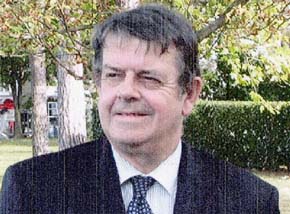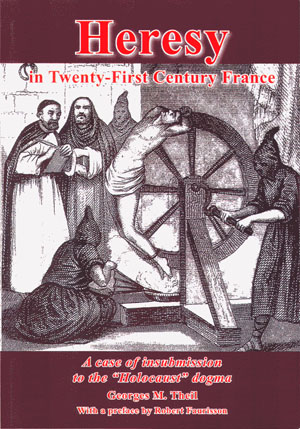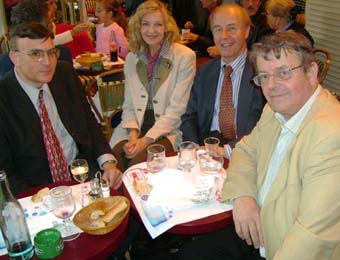French author Georges Theil is acquitted, after 44 months of procedure, in a case of distribution of his revisionist book

French author Georges Theil
click here for an earlier report on the Theil case by Prof Robert Faurisson
In 2002 Georges Theil put into circulation, under the pen name Gilbert Dubreuil, the original French version of his autobiographical work Heresy in 21st Century France – A Case of Insubmission to the “Holocaust” Dogma, sending copies to a few dozen journalists, historians (or supposed such), writers and media people in France who seemed interested in the subject.
In June 2004 two recipients of the book, known for their membership in the French Communist Party, brought charges under the Gayssot law which, since July 1990, has penalised the questioning of “truths” established at the Nuremberg “trial”. Subsequently Theil’s flat in Grenoble was raided by the police who, seizing his computers and papers, held him for questioning for 12 hours.

The book which led to Georges Theil's prosecution
There came a cascade of trials: Theil was convicted in first instance at Limoges high court and sentenced to six months’ imprisonment without remission and a fine of €30,000; the judges also stripped him of his civil rights (mainly, the right to stand for public office) for five years and ordered him to pay €12,000 in damages to various plaintiffs (the original two having been joined by some “remembrance” associations), as well as to cover the mandatory publication – costing about €8,000 – of their decision in several newspapers.
Having appealed against that judgment, Theil saw it largely upheld by the Limoges court of appeal, which even made a slight increase of the amounts to pay out to the associations; on the other hand, it removed the prohibition of political candidacy.
Then, after deciding to take his case to the highest court in the land – the Cour de Cassation –Theil’s perseverance was rewarded, thanks to the brilliant Eric Delcroix, his barrister and author of the brief: the Limoges appeal court’s ruling was effectively quashed on the grounds that the statute of limitations for cases concerning the press had not been respected: at the time the book went out, the period within which complaints had to be lodged was only three months, whereas the action had been brought against him a full year after the proved fact of circulation. The Cour de Cassation therefore referred the case to a second appeals court, that of Bordeaux, where it was heard on January 24, 2008. The decision came on March 6. That decision, which left the “remembrance” groups infuriated, was a discharge of Georges Theil, who had again been well represented, this time by barrister Delcroix’s successor, Frédéric Pichon: the accusers had simply had no business laying charges more than three months after the book’s acknowledged distribution. Thus Theil (after 44 months), must have his machines and documents restored to him, along with, of course, the sums already paid in damages. But he will not be gloating at this result, for it has merely been a question of a strict enforcement of the statute of limitations (for press matters) by the Bordeaux court. Only a certain legal hysteria, apt to trigger criminal proceedings at almost any sign of historical revisionism, was actually at issue here.

Georges Theil (far right) in Paris with translator Guillaume Fabien, Lady Michèle Renouf and former attorney Eric Delcroix
And Georges Theil’s troubles are not over, as there remains another case, originating in the city of Lyon and very much linked to the previous one. In October 2004, a few weeks after the first trial at Limoges where, as described above, he was found guilty and given a heavy sentence for his book, he was interviewed, face to face, by a reporter from a small TV station of the Savoy region. Asked to explain how he could write that the homicidal gas chambers hadn’t existed, Theil went into the problem on the scientific – physical and chemical – level, demonstrating in an irrefutable – and unrefuted – way the non-existence of those lethal installations. Then, in front of the reporter, he asked himself how it was that the general public continued to believe in their existence. The answer was that the public, consciously and even unconsciously, had been prepared to believe in it. For many decades (since the Krupp cannon of the war of 1870?), we have been led to believe that the Germans, so strong in technical and technological areas, must surely be capable of making that sort of thing. In people’s minds, perhaps no one in the world could design, build and “run” such installations, but the Germans could, for there’s the feeling, at once objective and vague, that the Germans are always ahead in all fields, with the diabolical touch that’s blithely ascribed to them. A bit like the alchemists of yore, they are readily credited with the worst “scientific” prowess.
That interview having been broadcast some days later, Theil was soon the object of an action (Gayssot law) by the local prosecutor. And in January 2005 a true witchcraft trial took place in Lyon – with Professor Robert Faurisson appearing as a witness – during which the presiding judge stubbornly refused any discussion of the basic points! Theil was found guilty and sentenced to another six months in prison and a €10,000 fine; he was also ordered to pay €40,000 to nine remembrance organisations and to cover the mandatory publication of the decision, along with other costs, all amounting to more than €70,000. Appealing against this judgment as well, he went before the Lyon court of appeal the following year. The leading lawyer for the plaintiff associations, barrister Jakubowicz, known for his incandescent hatred of revisionists, had the presumption to offer Theil a deal right in the middle of court: if he agreed to acknowledge the existence of the gas chambers and the millions who had died in them, then the associations might consider dropping their claims for damages… Georges Theil’s reply was clear-cut and brief in the extreme: “There’s no question of it!”
The prosecutor, for his part, had the nerve to build up a harangue worthy of the Inquisition tribunals, like a prelate with the job of punishing a heretic! And he asked the court “not to rule against Theil any more lightly than the Limoges court of appeal”! Little did the poor official imagine that the Limoges decision would be quashed and a discharge pronounced… One anomaly to be noted is that the video recording of the interview, requested for the hearing by the presiding judge himself and supposedly kept under seal at the clerk’s office, was impossible to find, and Theil was convicted nonetheless.
Currently Theil is preparing to face the “judge for the implementation of sentences” (Juge d’application des peines) in Grenoble at an appeal hearing set for May 30th, where it will be decided whether the six month sentence handed down in Lyon is to be served in an actual prison or at home with an electronic tag on his person, the latter possibility having recently been refused for want of any repentance on the convict’s part.
Let’s support Georges Theil who, along with a few others – Robert Faurisson, Ernst Zündel, Germar Rudolf, Sylvia Stolz, Wolfgang Froehlich, Fredrick Toben, Vincent Reynouard – has chosen to be at the forefront of the highly risky struggle against a hoax and slander and, let it be plainly said, for our survival.
G. Theil
BP 50-38
F-38037 Grenoble Cedex 2
(gmtheva@yahoo.fr)
His book in French is available from the above address for €13 per copy, including postage to all European Union countries (+ Switzerland and Norway). Likewise the English version: price €20 (or 25 USD), postage outside Europe included.
|
 |
|